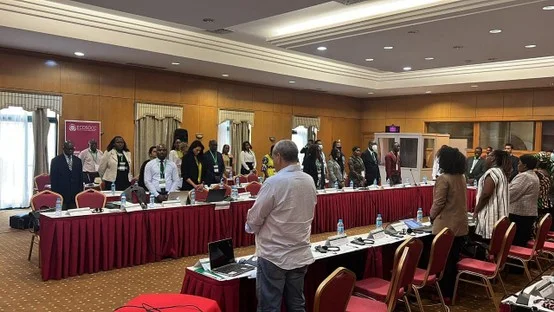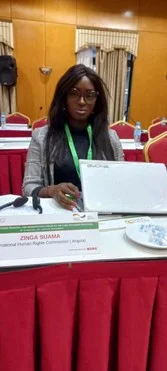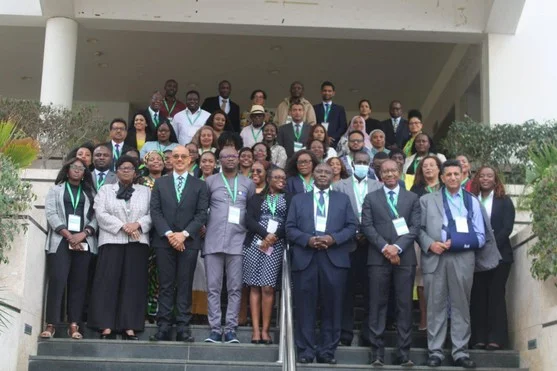SECOND REGIONAL SENSITIZATION FORUM 2022.
Foreign Affairs > Information > Supranational > AU ECOSOCC

ZINGA CLARA SUAMA REPRESENT INTERNATIONAL HUMAN RIGHTS COMMISSION (ANGOLA) AT THE (AU- ECOSOCC) SECOND REGIONAL SENSITIZATION FORUM 2022.
African Civil Society Organizations (CSOs) in eastern and southern Africa have been prompted to support and promote the implementation of the African Union’s Free Movement Protocol (FMP) and the Migration Policy Framework for Africa (MPFA).
The call to action to CSOs was made during the opening of the second Regional CSO Sensitization Forum on the Continental Free Movement Protocol organized by the AU Economic, Social, and Cultural Council (AU-ECOSOCC) with support from the Deutsche Gesellschaft für Internationale Zusammenarbeit (GIZ).
The forum is being held to popularize the FMP and MPFA, and particularly to improve the understanding of African CSOs on the FMP and to provide them with tools to perform advocacy for implementation of the Protocol by AU member states. The first forum was held in May, 2022 for western and central African CSOs. Find the communique here.
The FMP and the MPFA have been established by the AU as the primary policy frameworks to address, manage, and promote migration and mobility on the continent.
The FMP, in particular, aims to curb and eventually eliminate barriers to regional border migration (to work, visit, trade, live, etc.) within the continent. Eliminating these barriers translates to economic growth on the continent as well as improved migration procedures for African citizens.
Unfortunately, despite the existence of these migration policy frameworks, policy uptake among AU member states and their popularization within African civil society remains low and has not achieved the desired impact.
Officially opening the forum, through a key note address, Mozambique’s Ambassador to the AU, H.E Alfredo Nuvunga, on behalf of the Minister of Foreign Affairs and Cooperation of Mozambique, H.E Veronica Dlhovo, said despite a number of challenges characterized by the dynamics the world was currently experiencing, free movement of people was a fundamental element for the development and well-being of nations.
“These challenges should not intimidate us in opening our borders, on the contrary, they should encourage us in the coordinated search for collective measures both at regional and continental levels for the establishment of an increasingly integrated and prosperous continent,” he said.



Amb. Nuvunga explained that at the Southern African Development Community (SADC) level, Free Movement was the subject of consideration by the Ministerial Committee of the Organ (CMO) meeting in August 2016, in Maputo, having recommended a gradual approach, safeguarding the sovereignty of states, guaranteeing the existence of peace, security and stability on the continent and convergence between member states, in order to reduce economic imbalances.
He emphasized that the involvement of civil society would broaden the field of analysis in order to allow all social segments to review the implementation of the protocol.
Amb. Ruediger Zettel, German Deputy Ambassador to Mozambique, highlighted the critical importance of the forums noting that, “Free movement on the continent is key to ensuring development and better trade relations.” He commended the African Union Commission for the collaborative work on the Free Movement initiative noting that it would ensure the inclusion of African citizens in the migration discourse.
African Union Commission Strategic Advisor to the Deputy Chairperson, Ambassador Aljowaly, stressed the importance of the FMP and looked to CSOs to not only engage and sensitise it but also to give feedback garnered from the CSOs networks on the process.
Mr. Denise Kodhe ECOSOCC Presiding Officer emphasized the role of the African CSO in holding governments accountable for their international commitments and reiterated ECOSOCC's commitment to ensuring that the collaborative partnership with the GIZ on the FMP initiative was a success.
“I would like to personally implore all members of civil society, to use your voices and platforms in domesticating, popularizing and promoting the implementation of these continental and regional migration policies on our continent,” said Mr William Carew, Head of the ECOSOCC Secretariat. “I appeal to you members of the civil society to take a leading role in pushing parent member states in prioritizing labour migration and free movement issues.”
He reiterated ECOSOCC’s commitment in ensuring that the proposed solutions to all the standing issues and any new arising issues, would be handled by the African Union Commission and its partner GIZ expediently.
Amb. David Claude Pierre, Permanent Representative to AU Southern African Regional Office said the FMP is a tool which could be used to realize other developmental goals as well as facilitate the fulfilment of the objectives of the African Continental free Trade Area (AfCFTA).
“Success of the Free movement of persons equals success of the AfCFTA. The success of the AfCFTA will create many jobs for young Africans. The success of the AfCFTA would also lead to significant increase in trade and investment among African countries.”
He encouraged AU member states to not only sign, but also to ratify and domesticate it.
The CSOs convened at the forum represent a diverse range of technical experts in a range of thematic areas that intersect with the continent's free movement agenda. As a result, participant-led presentations are showcasing the expert-level discussions on cross-cutting and pressing issues within the FMP, such as social-economic rights, peace, security, human rights, women and youth, climate change, health security, and food security.
Most importantly, the forum will identify the tools and capacity-building requirements for civil society to participate in the protocol's implementation.
The forum's deliberations will be consolidated into a plan of action focusing on advocacy, promotion, ratification, domestication and implementation of the AU's FMP, and particularly in addressing areas where civil society's capacity and engagement require strengthening.
In view of the above, the Forum made the following observations and recommendations:
1. Acknowledged that AU Heads of State and Government had adopted the requisite policy decisions on the free movement of people, including Agenda 2063.
2. The Forum commended the 12 ECOWAS member states that had already signed the FMP and the three (Niger, Sao Tome and Principe and Mali) that had ratified all relevant AU instruments on the free movement of people; and encouraged other ECOWAS and ECCAS member states which have not ratified to do so ahead of the upcoming 60th Anniversary of the OAU/AU in May 2023.
3. The Forum commended ECOWAS member states that issue visas on arrival to fellow African citizens and urged other ECOWAS and ECCAS member states to put in place necessary measures to ensure either the removal of visas for fellow Africans or the issuance of visa on arrival for African citizens without compromising the necessary security precautions.
4. The Forum appealed to ECOWAS and ECCAS member states to give full effect to the spirit of the FMP and refrain from imposing harsh penalties on fellow African citizens.
5. The Forum urged ECOWAS and ECCAS member states to address all institutional, legal and regulatory obstacles and as well as capacity gaps in order to give full effect to the FMP in the ECOWAS and ECCAS regions.
6. The Forum emphasized the need for ECOWAS and ECCAS member states to strengthen and deepen mutual trust for collaboration in addressing security, climate and humanitarian challenges that affect the free movement of people.
7. The Forum underscored the importance of structured and institutionalized collaboration between and amongst ECOWAS and ECCAS member states, immigration, defence, security and intelligence, humanitarian agencies and labour unions and civil society working in close collaboration with the relevant African, local government and international institutions in order to share knowledge and information, mutual assistance, scalable practices as well as develop requisite capacity development.
8. The Forum stressed the urgent need to modernize border management systems and rationalize labour migration, and other relevant policies.
9. The Forum urged ECOWAS and ECCAS to strengthen mechanisms for protection of migrants, refugees and IDPs within the two regions as well as combat xenophobia.
10. The Forum requested ECOWAS and ECCAS member states, the ECOWAS Parliament, and national parliaments to expedite the ratification, domestication and implementation of the FMP, pursuant to the African Union Assembly decision (Assembly/AU/DEC.607 (XXVII)).
11. The Forum implored ECOWAS and ECCAS member states that, in resolving any matters that arise within their territories, they should avoid taking such measures that would undermine the rights as enshrined in the FMP and related policy frameworks and become punitive to vulnerable communities.
Reported:
Commissioner of Youth
Head of World Youth Movement,
Peace Ambassador and SMM MNVC In Africa.




